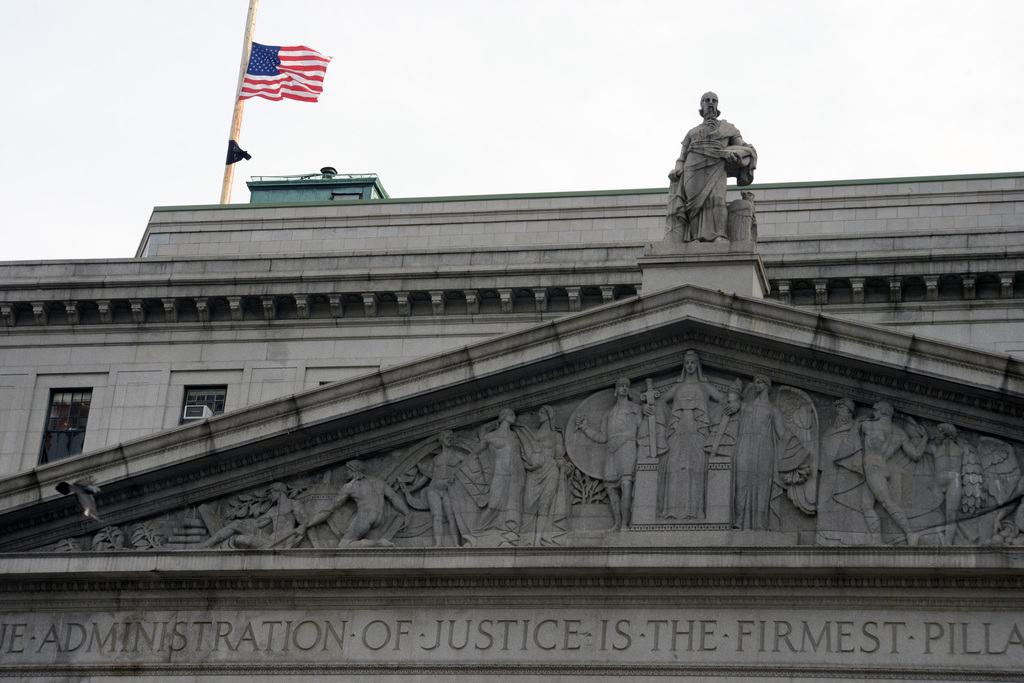Defendants Allege Perjury in $2 Billion Lawsuit Involving Russian Billionaires
Attorneys for defendants said in the filing that Leonid Lebedev, another billionaire and former politician in Russia, has been lying about his relationship with a company at the center of the lawsuit since it was filed in 2014.
August 01, 2018 at 05:36 PM
5 minute read
 Manhattan Supreme Court at 60 Center Street Defendants in a $2 billion lawsuit involving three billionaires—two Russians and an American who emigrated from Russia—said in a new filing that the legal action should be dismissed after the plaintiff in the case allegedly perjured himself. Attorneys for defendants Len Blavatnik and Viktor Vekselberg said in the filing that Leonid Lebedev, another billionaire and former Russian politician, has been lying about his relationship with a company at the center of the lawsuit since it was filed in 2014. Blavatnik, a Russian immigrant, and Vekselberg are being represented by Richard Werder and Stephen Broome from Quinn Emanuel Urquhart & Sullivan in Manhattan. Blavatnik has also retained Mark Zauderer from Ganfer Shore Leeds & Zauderer in Manhattan, and Vekselberg has retained Paul Carberry from White & Case, also in Manhattan. Lebedev is represented by Thomas Dewey of Dewey Pegno & Kramarsky and Michael Campion Miller from Steptoe & Johnson, both in Manhattan. Lebedev's lawsuit centers around his claim that the three billionaires agreed to pool their cash, stock and other assets to obtain control over an oil and gas company in the late 1990s. That company was Tyumenskaya Neftyanaya Kompania, or TNK. According to the Lebedev lawsuit, Blavatnik and Vekselberg approached him in 1997 about working together to acquire newly privatized shares of TNK. Lebedev said he contributed $25 million to the venture, his own equity in TNK, and his equity in a key production subsidiary of TNK. According to Lebedev, the three met in New York City in 2001 to formalize the joint venture. His lawsuit claimed they agreed during the meeting that he was entitled to a 15 percent share of the offshore company through which Blavatnik and Vekselberg held their interest in TNK, 15 percent of the income that company received from TNK, and a right to 15 percent of its stock. Two years later, the defendants and Alfa Group, which controlled the rest of TNK, started a joint venture with British Petroleum. Lebedev claimed he was entitled to a direct or indirect 3.75 percent share of the proposed venture between BP and TNK. He also claimed he was pressured to conceal his interest in TNK from BP to avoid tanking the partnership. Blavatnik and Vekselberg said that after extensive negotiations, they drafted an agreement with Lebedev between Rochester Resources, a company controlled by the defendants, and Coral Petroleum, which Lebedev had used to facilitate his relationship with the other two billionaires. Rochester Resources agreed to pay Coral $600 million on Lebedev's behalf. The money was paid to acquire a promissory note that the defendants' company issued to Coral at Lebedev's request, and any and all TNK-related rights, claims, and interests of Coral and its affiliates, attorneys for Blavatnik and Vekselberg claimed. That's where the three billionaires disagree and the defendants' claim of perjury originates. Lebedev claimed he did not own or control Coral and had a very limited relationship with the company. He claimed Coral had the ability to dispose of his claimed right to get income on a periodic basis from TNK, but did not have the right to dispose of his ownership interest in TNK. Blavatnik and Vekselberg claimed the $600 million was essentially a buyout and that Lebedev is not owed anything else. Based on the huge success of the TNK-BP partnership, which has since been sold to Rosneft, the Russian state-owned oil giant, Lebedev claimed he's still owed a share of the partnership, which he said would exceed $2 billion. But Lebedev's case could hit a snag resulting from documents obtained through discovery by lawyers for Blavatnik and Vekselberg. They have claimed since the inception of the lawsuit that there was no way Coral acted outside of Lebedev's interests in 2003 because he controlled Coral. Lebedev denied that claim in a 2014 statement, saying Martin Bartek, a race car driver, owned and controlled Coral. New documents obtained in the case contradict Lebedev's statement, attorneys for Blavatnik and Vekselberg said in their filing. “Lebedev, not Bartek, owned and controlled Coral—including any activities that Coral may have engaged in as an oil and gas trader,” attorneys wrote in the motion. Most of the details used to support that finding have been redacted in the filing, but attorneys write that Lebedev was controlling and funding both Coral's day-to-day activities and its extraordinary lending and investment transactions. They claimed Bartek was a service provider, not Coral's owner. “It could not be any clearer that Coral was Lebedev's company, not Bartek's, and that Lebedev has consistently lied to the Court and Defendants about his lack of ownership and control of Coral in order to advance his claims in this action,” the motion said. They are seeking for Lebedev's complaint to be dismissed and to be awarded costs and attorney fees. They said in the motion that Lebedev intentionally disassociated himself with Coral to avoid dismissal. “This case would have been far more efficient, and discovery could have concluded years ago, if Lebedev had not lied about his ownership and control of Coral,” the attorneys wrote. Attorneys for Lebedev did not respond to a request for comment on the motion Wednesday. The case is being litigated in Manhattan Supreme Court before Justice Saliann Scarpulla.
Manhattan Supreme Court at 60 Center Street Defendants in a $2 billion lawsuit involving three billionaires—two Russians and an American who emigrated from Russia—said in a new filing that the legal action should be dismissed after the plaintiff in the case allegedly perjured himself. Attorneys for defendants Len Blavatnik and Viktor Vekselberg said in the filing that Leonid Lebedev, another billionaire and former Russian politician, has been lying about his relationship with a company at the center of the lawsuit since it was filed in 2014. Blavatnik, a Russian immigrant, and Vekselberg are being represented by Richard Werder and Stephen Broome from Quinn Emanuel Urquhart & Sullivan in Manhattan. Blavatnik has also retained Mark Zauderer from Ganfer Shore Leeds & Zauderer in Manhattan, and Vekselberg has retained Paul Carberry from White & Case, also in Manhattan. Lebedev is represented by Thomas Dewey of Dewey Pegno & Kramarsky and Michael Campion Miller from Steptoe & Johnson, both in Manhattan. Lebedev's lawsuit centers around his claim that the three billionaires agreed to pool their cash, stock and other assets to obtain control over an oil and gas company in the late 1990s. That company was Tyumenskaya Neftyanaya Kompania, or TNK. According to the Lebedev lawsuit, Blavatnik and Vekselberg approached him in 1997 about working together to acquire newly privatized shares of TNK. Lebedev said he contributed $25 million to the venture, his own equity in TNK, and his equity in a key production subsidiary of TNK. According to Lebedev, the three met in New York City in 2001 to formalize the joint venture. His lawsuit claimed they agreed during the meeting that he was entitled to a 15 percent share of the offshore company through which Blavatnik and Vekselberg held their interest in TNK, 15 percent of the income that company received from TNK, and a right to 15 percent of its stock. Two years later, the defendants and Alfa Group, which controlled the rest of TNK, started a joint venture with British Petroleum. Lebedev claimed he was entitled to a direct or indirect 3.75 percent share of the proposed venture between BP and TNK. He also claimed he was pressured to conceal his interest in TNK from BP to avoid tanking the partnership. Blavatnik and Vekselberg said that after extensive negotiations, they drafted an agreement with Lebedev between Rochester Resources, a company controlled by the defendants, and Coral Petroleum, which Lebedev had used to facilitate his relationship with the other two billionaires. Rochester Resources agreed to pay Coral $600 million on Lebedev's behalf. The money was paid to acquire a promissory note that the defendants' company issued to Coral at Lebedev's request, and any and all TNK-related rights, claims, and interests of Coral and its affiliates, attorneys for Blavatnik and Vekselberg claimed. That's where the three billionaires disagree and the defendants' claim of perjury originates. Lebedev claimed he did not own or control Coral and had a very limited relationship with the company. He claimed Coral had the ability to dispose of his claimed right to get income on a periodic basis from TNK, but did not have the right to dispose of his ownership interest in TNK. Blavatnik and Vekselberg claimed the $600 million was essentially a buyout and that Lebedev is not owed anything else. Based on the huge success of the TNK-BP partnership, which has since been sold to Rosneft, the Russian state-owned oil giant, Lebedev claimed he's still owed a share of the partnership, which he said would exceed $2 billion. But Lebedev's case could hit a snag resulting from documents obtained through discovery by lawyers for Blavatnik and Vekselberg. They have claimed since the inception of the lawsuit that there was no way Coral acted outside of Lebedev's interests in 2003 because he controlled Coral. Lebedev denied that claim in a 2014 statement, saying Martin Bartek, a race car driver, owned and controlled Coral. New documents obtained in the case contradict Lebedev's statement, attorneys for Blavatnik and Vekselberg said in their filing. “Lebedev, not Bartek, owned and controlled Coral—including any activities that Coral may have engaged in as an oil and gas trader,” attorneys wrote in the motion. Most of the details used to support that finding have been redacted in the filing, but attorneys write that Lebedev was controlling and funding both Coral's day-to-day activities and its extraordinary lending and investment transactions. They claimed Bartek was a service provider, not Coral's owner. “It could not be any clearer that Coral was Lebedev's company, not Bartek's, and that Lebedev has consistently lied to the Court and Defendants about his lack of ownership and control of Coral in order to advance his claims in this action,” the motion said. They are seeking for Lebedev's complaint to be dismissed and to be awarded costs and attorney fees. They said in the motion that Lebedev intentionally disassociated himself with Coral to avoid dismissal. “This case would have been far more efficient, and discovery could have concluded years ago, if Lebedev had not lied about his ownership and control of Coral,” the attorneys wrote. Attorneys for Lebedev did not respond to a request for comment on the motion Wednesday. The case is being litigated in Manhattan Supreme Court before Justice Saliann Scarpulla.This content has been archived. It is available through our partners, LexisNexis® and Bloomberg Law.
To view this content, please continue to their sites.
Not a Lexis Subscriber?
Subscribe Now
Not a Bloomberg Law Subscriber?
Subscribe Now
NOT FOR REPRINT
© 2025 ALM Global, LLC, All Rights Reserved. Request academic re-use from www.copyright.com. All other uses, submit a request to [email protected]. For more information visit Asset & Logo Licensing.
You Might Like
View All
Haynes and Boone Expands in New York With 7-Lawyer Seward & Kissel Fund Finance, Securitization Team
3 minute read
Ticket-Fixing Scheme Results in Western NY Judge's Resignation—for a Second Time

Disbarred NY Atty Receives 54-Month Prison Sentence After $3M Embezzlement
3 minute read
Legal Community Mourns the Loss of Trailblazing Judge Dorothy Chin Brandt
Trending Stories
- 1Justified Termination Does Not Bar Associate Attorney From Unemployment Benefits, State Appellate Court Rules
- 2Effective Termination Strategies in Today’s Troubled Condo Market
- 3AI and Land Use—a Perfect Match in Real Estate Heaven
- 4New Atlanta Litigation Firm Breaks Away From Swift Currie
- 5Florida Law Schools Are Seeing a Bump in Applications for 2025, After Recent Declines at Flagship Schools
Who Got The Work
J. Brugh Lower of Gibbons has entered an appearance for industrial equipment supplier Devco Corporation in a pending trademark infringement lawsuit. The suit, accusing the defendant of selling knock-off Graco products, was filed Dec. 18 in New Jersey District Court by Rivkin Radler on behalf of Graco Inc. and Graco Minnesota. The case, assigned to U.S. District Judge Zahid N. Quraishi, is 3:24-cv-11294, Graco Inc. et al v. Devco Corporation.
Who Got The Work
Rebecca Maller-Stein and Kent A. Yalowitz of Arnold & Porter Kaye Scholer have entered their appearances for Hanaco Venture Capital and its executives, Lior Prosor and David Frankel, in a pending securities lawsuit. The action, filed on Dec. 24 in New York Southern District Court by Zell, Aron & Co. on behalf of Goldeneye Advisors, accuses the defendants of negligently and fraudulently managing the plaintiff's $1 million investment. The case, assigned to U.S. District Judge Vernon S. Broderick, is 1:24-cv-09918, Goldeneye Advisors, LLC v. Hanaco Venture Capital, Ltd. et al.
Who Got The Work
Attorneys from A&O Shearman has stepped in as defense counsel for Toronto-Dominion Bank and other defendants in a pending securities class action. The suit, filed Dec. 11 in New York Southern District Court by Bleichmar Fonti & Auld, accuses the defendants of concealing the bank's 'pervasive' deficiencies in regards to its compliance with the Bank Secrecy Act and the quality of its anti-money laundering controls. The case, assigned to U.S. District Judge Arun Subramanian, is 1:24-cv-09445, Gonzalez v. The Toronto-Dominion Bank et al.
Who Got The Work
Crown Castle International, a Pennsylvania company providing shared communications infrastructure, has turned to Luke D. Wolf of Gordon Rees Scully Mansukhani to fend off a pending breach-of-contract lawsuit. The court action, filed Nov. 25 in Michigan Eastern District Court by Hooper Hathaway PC on behalf of The Town Residences LLC, accuses Crown Castle of failing to transfer approximately $30,000 in utility payments from T-Mobile in breach of a roof-top lease and assignment agreement. The case, assigned to U.S. District Judge Susan K. Declercq, is 2:24-cv-13131, The Town Residences LLC v. T-Mobile US, Inc. et al.
Who Got The Work
Wilfred P. Coronato and Daniel M. Schwartz of McCarter & English have stepped in as defense counsel to Electrolux Home Products Inc. in a pending product liability lawsuit. The court action, filed Nov. 26 in New York Eastern District Court by Poulos Lopiccolo PC and Nagel Rice LLP on behalf of David Stern, alleges that the defendant's refrigerators’ drawers and shelving repeatedly break and fall apart within months after purchase. The case, assigned to U.S. District Judge Joan M. Azrack, is 2:24-cv-08204, Stern v. Electrolux Home Products, Inc.
Featured Firms
Law Offices of Gary Martin Hays & Associates, P.C.
(470) 294-1674
Law Offices of Mark E. Salomone
(857) 444-6468
Smith & Hassler
(713) 739-1250






